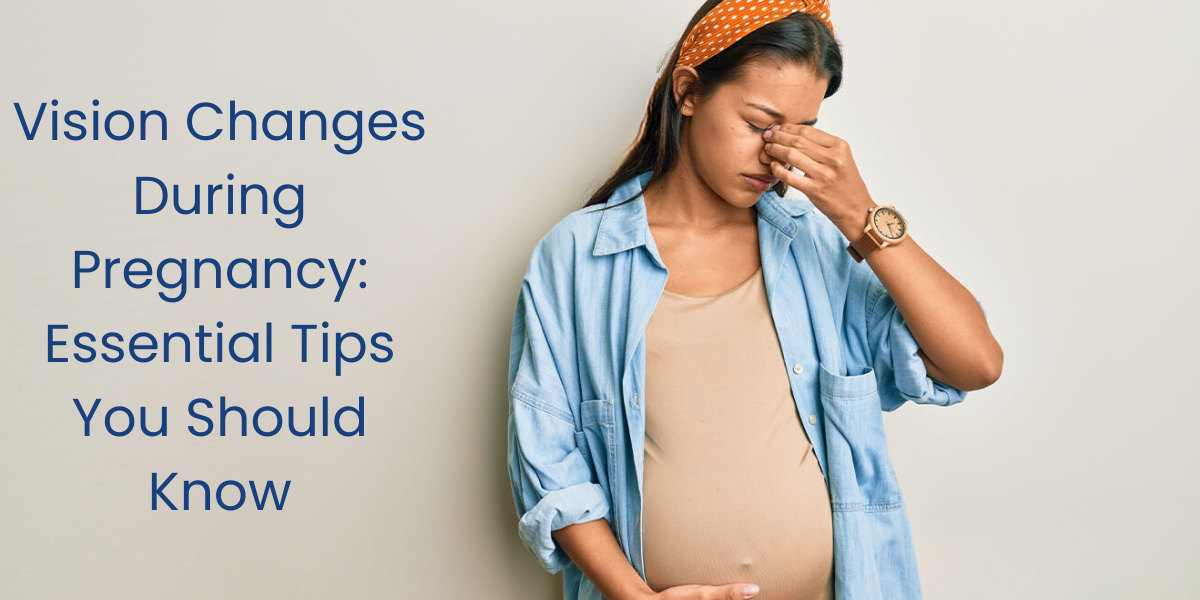Pregnancy is an exciting time filled with many physical changes, but did you know it can also affect your vision? Hormonal shifts, fluid retention, and increased blood circulation can lead to temporary changes in your eyesight. While most of these changes are harmless and resolve after delivery, some may require medical attention.
Here, we’ll explore common vision changes during pregnancy, what they mean, and how to manage them. We’ll also highlight when it’s important to consult an eye doctor.
Common Vision Changes During Pregnancy
Here are some of the most typical vision changes that women experience during pregnancy:
1. Blurry Vision
Many pregnant women experience blurred vision due to hormonal fluctuations. These hormones can alter the shape and thickness of the cornea, which may result in temporary vision changes. If you’re finding it hard to focus or notice blurriness, especially when looking at distant objects, it’s usually nothing to worry about. However, if the problem persists or worsens, you should get it checked out.
2. Dry Eyes
Hormonal changes can also affect tear production, leading to dry, irritated eyes. This condition, known as dry eye syndrome, can cause discomfort, a gritty sensation, and sensitivity to light. Artificial tears or lubricating eye drops are usually safe during pregnancy but always consult with your healthcare provider before using any medication.
3. Sensitivity to Light
Some pregnant women develop photophobia, which is an increased sensitivity to light. You might notice that bright lights or spending time outdoors in sunlight becomes uncomfortable. Wearing sunglasses with UV protection and reducing screen time can help alleviate these symptoms.
4. Changes in Prescription
If you wear glasses or contact lenses, you might notice that your prescription no longer feels right. The hormonal changes affecting your cornea can make your vision fluctuate, leading to the need for a temporary change in your prescription. If these changes affect your daily activities, consult an eye doctor to discuss adjusting your prescription during pregnancy.
5. Preeclampsia and Vision Problems
Preeclampsia, a condition characterized by high blood pressure during pregnancy, can cause serious vision problems such as blurred vision, seeing spots, and temporary blindness. If you experience any of these symptoms along with headaches, swelling, or dizziness, seek immediate medical attention. Preeclampsia is a medical emergency that requires prompt treatment.
Managing Vision Changes During Pregnancy
Although most vision changes during pregnancy are temporary, it’s still important to take steps to care for your eyes. Here are some tips to help you manage your eye health during this period:
1. Stay Hydrated
Dehydration can make symptoms like dry eyes worse. Make sure you’re drinking enough water throughout the day to help maintain proper moisture levels in your eyes.
2. Use Artificial Tears
For dry eyes, ask your doctor about using artificial tears or lubricating drops that are safe for pregnant women. These can provide relief from irritation and help maintain eye comfort.
3. Wear Sunglasses
Wearing sunglasses with UV protection is crucial, especially if you experience light sensitivity. This will help protect your eyes from the sun’s harmful rays and reduce discomfort from bright light.
4. Rest Your Eyes
If you spend a lot of time looking at screens, make sure to take regular breaks. Follow the 20-20-20 rule: every 20 minutes, look at something 20 feet away for 20 seconds. This will help reduce eye strain and fatigue.
5. Get Regular Eye Checkups
Even though vision changes during pregnancy are often temporary, it’s still important to get regular eye checkups. Your eye doctor can monitor any changes and recommend treatments if needed. If you have pre-existing eye conditions like glaucoma or diabetes, maintaining regular visits with your eye care provider becomes even more essential during pregnancy.
When to See an Eye Doctor
While many pregnancy-related vision changes are harmless, certain symptoms should not be ignored. If you experience the following, it’s time to consult an eye doctor:
- Sudden or severe vision loss
- Persistent blurry vision
- Seeing spots, flashes, or halos
- Extreme sensitivity to light
- Eye pain or pressure
These symptoms could be related to more serious conditions like preeclampsia or gestational diabetes and should be evaluated immediately.
Vision After Pregnancy
The good news is that most vision changes during pregnancy are temporary and will return to normal after delivery or after breastfeeding ends. However, some women may experience lasting changes in their prescription, so it’s a good idea to schedule a follow-up eye exam after your baby is born.
If you’re experiencing vision changes during pregnancy and live in or around Moshi,. Dr. Vasundhara Kulkarni, a highly experienced eye doctor at Iris Eye Care Clinic, can help monitor your eye health and provide the necessary treatments or advice. Whether it’s managing dry eyes, adjusting your prescription, or addressing more serious issues like preeclampsia-related vision problems, Dr. Kulkarni and her team are here to support you during this special time.
To schedule a consultation with Dr. Vasundhara Kulkarni, visit Iris Eye Care Clinic, your trusted Eye Doctor in Moshi for comprehensive and compassionate eye care.
Final Thoughts
While vision changes during pregnancy can be an unexpected and sometimes frustrating part of your journey, they are usually temporary and manageable. By staying informed and taking the right steps to care for your eyes, you can ensure both your comfort and long-term eye health. If any unusual symptoms arise, don’t hesitate to seek professional help from an eye doctor to safeguard your vision throughout your pregnancy.

